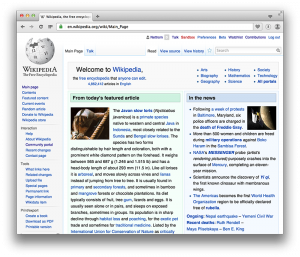Atlasify: Towards the “Geography of Everything”
By Brent Hecht on
By Brent Hecht on
By Morten Warncke-Wang on
 Wikipedia’s best content is mainly where its readers aren’t. For instance, the article about weddings is seen thousands of times every day, yet the community labels it “quite incomplete”, its prose “distinctly unencyclopedic”, and a call for additional sources to verify its content has been featured prominently at the top of the article for over four years. It turns out that this is not uncommon; each month Wikipedia’s articles are viewed billions of times, and over 40% of these views are to articles that would be of significantly higher quality if the encyclopaedia’s contributors followed their readers.
Wikipedia’s best content is mainly where its readers aren’t. For instance, the article about weddings is seen thousands of times every day, yet the community labels it “quite incomplete”, its prose “distinctly unencyclopedic”, and a call for additional sources to verify its content has been featured prominently at the top of the article for over four years. It turns out that this is not uncommon; each month Wikipedia’s articles are viewed billions of times, and over 40% of these views are to articles that would be of significantly higher quality if the encyclopaedia’s contributors followed their readers.
By Max Harper on
It has been about six years since we released our previous major ratings dataset, MovieLens 10M. Today, we have released its successor, MovieLens 20M, alongside two new non-archival datasets for education and development. These datasets are available for download at http://grouplens.org/datasets/movielens/. (more…)
By Jacob Thebault-Spieker on
We’d like to congratulate two GroupLens Ph.D. students – Hannah Miller (@hannahjean515, website) and Taavi Taijala – on being awarded National Science Foundation Graduate Research Fellowships!

 Hannah’s proposal focused on strengthening a social network user’s experience by bootstrapping from previously established social network presence.
Hannah’s proposal focused on strengthening a social network user’s experience by bootstrapping from previously established social network presence.
Taavi proposed work on better explaining recommender systems output, focusing on the use of analogies to describe recommendations.
There were more than 16,000 applications for the Graduate Research Fellowship nationwide from all areas of science and engineering. The National Science Foundation (NSF) only awarded them to 2,000 students (of which GroupLens members were 0.1%!). The awards financially support 36 months of research and include opportunities for international research experiences.
Congratulations again, Taavi and Hannah!
By shuo chang on
According to the song, “Getting to know you…. getting to know all about you…” is a lot of fun. But when you go to a new doctor, and fill out a 10-page patient intake form so the doctor can get to know you, it’s not so much fun.
The same has been true for recommender systems. A typical experience for new users is to rate a bunch of items to let the system know their preferences. For example, in the MovieLens film recommender, first-time visitors had to rate 15 movies (see the screen below). This process usually required paging through multiple screens, took over 5 minutes, and discouraged some people so much they dropped out before ever making it to the site home page! (more…)